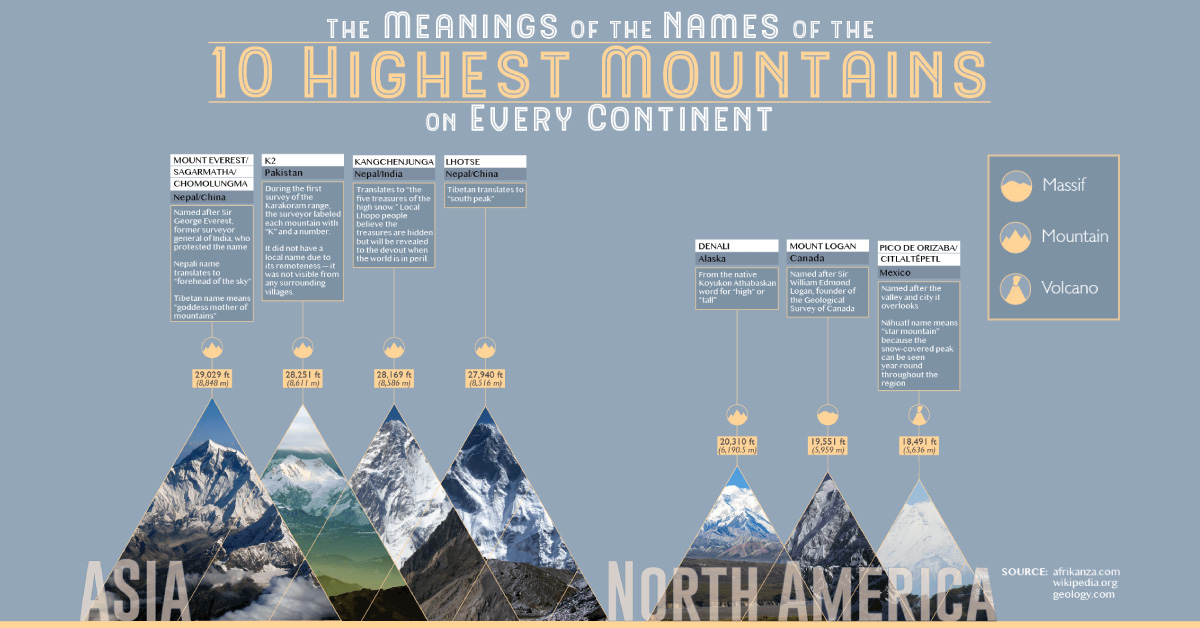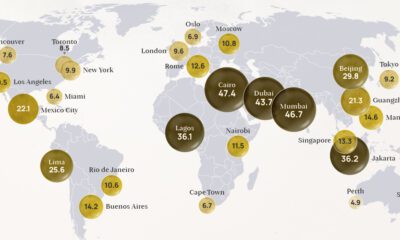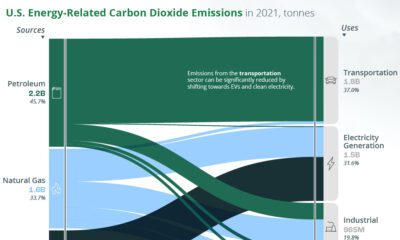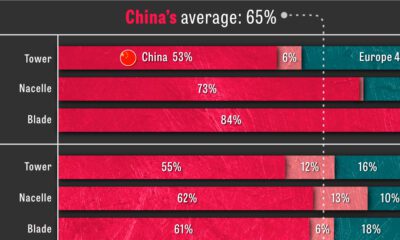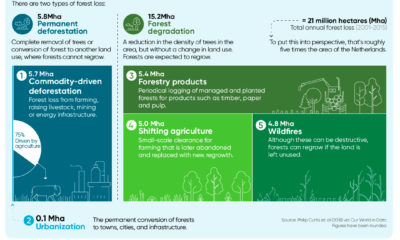Misc
The World’s Highest Mountains, And What Their Names Mean
View the full-size version of this infographic.
World’s Highest Mountains, and What Their Names Mean
View the high resolution version of this infographic by clicking here
From the Himalayas to the Andes, mountains have inspired and awed us for thousands of years.
Humans have ascribed all sorts of mythologies and metaphors to these jagged geological features. But while Everest or Kilimanjaro may ring a bell, do you know the meaning behind their names?
Today’s infographic from Alan’s Factory Outlet sorts the world’s highest mountains by continent, and explains the detailed origins of their names.
A Mountain By Any Other Name
Out of the 70 mountains profiled, only 41 are actually considered mountains. The rest are technically either a massif or a volcano (or a dome in one instance).
A massif (French for ‘massive’) is produced when a hard, unbendable rock is pushed towards the surface. They can also be formed when magma hardens once it’s above ground. For the rest of this post, we’ll refer to mountains and massifs interchangeably.
The highest mountains on each continent are considered to be part of the Seven Summits. Mountaineer Richard Bass was the first to scale all seven summits in 1985—and the 55-year old did so in only one year.
The Highest Mountain on Each Continent
| Name | Location | Height | Meaning of Name |
|---|---|---|---|
| Mount Everest | Nepal/ China, Asia | 29,029ft (8,848m) | After Sir George Everest, former surveyor of India Nepali name (Sagarmatha): “Forehead of the Sky” Tibetan name (Chomolungma): “Goddess Mother of Mountain” |
| Aconcagua | Argentina, S. America | 22,841ft (6,962m) | Various native words: “Comes from the other side”, “Sentinel of stone”, “White sentinel”, “white ravine” |
| Denali | Alaska, U.S., N. America | 20,310ft (6,190m) | Native Koyukon Athabascan: ‘high’ or ‘tall’ |
| Mount Kilimanjaro | Tanzania, Africa | 19,341ft (5,895m) | Unclear, but some suggest it is a combination of Swahili 'Kilma' ("mountain") and KiChagga 'Njaro' ("whiteness") |
| Mount Elbrus | Russia, Europe | 18,510ft (5,642m) | Derived from Iranian mythology for legendary mountain ‘Avestan Hara Berezaiti’: “high watchtower” |
| Vinson Massif | Antarctica | 16,050ft (4,892m) | After Carl G. Vinson, a congressman from Georgia who supported the Antarctic Exploration |
| Puncak Jaya | Indonesia, Asia/ Oceania | 16,024ft (4,884m) | Sanskrit: "Victorious mountain" |
Among these impressive peaks, two are technically volcanoes—Mount Kilimanjaro in Tanzania, and Mount Elbrus in Russia. Overall, it’s clear that a majority of their names have been influenced by the native languages in their surroundings.
The 10 Asian Giants
The highest mountains in the world are all in Asia, with nine of the ten highest found in the Himalayan range. Many of their names are derived from Sino-Tibetan languages, and some have mythological or religious influences.
| Name | Location | Height | Meaning of Name |
|---|---|---|---|
| Mount Everest | Nepal/ China | 29,029ft (8,848m) | After Sir George Everest, former surveyor of India Nepali name (Sagarmatha): “Forehead of the Sky” Tibetan name (Chomolungma): “Goddess Mother of Mountain” |
| K2 | Pakistan | 28,251ft (8,611m) | First surveyor labeled each mountain with a K and number. It has no local name due to its remoteness |
| Kangchenjunga | Nepal/ India | 28,169ft (8,586m) | Lhopo: “Five treasures of the high snow” |
| Lhotse | Nepal/ China | 27,940ft (8,516m) | Tibetan: “South peak” |
| Makalu | Nepal/ China | 27,838ft (8,485m) | Sanskrit origin: “Big Black”, the name for the Hindu god Shiva |
| Cho Oyu | Nepal | 26,864ft (8,188m) | Tibetan: “Turquoise goddess” |
| Dhaulagiri (*Massif) | Nepal | 26,795ft (8,167m) | Sanskrit origin: ‘Dazzling, beautiful, white mountain’ |
| Manaslu | Nepal | 26,781ft (8,163m) | Tibetan: ‘Mountain of the spirit’ Sanskrit origin (Manasa): ‘intellect’ or ‘soul’ |
| Nanga Parbat | Pakistan | 26,660ft (8,126m) | Sanskrit origin: “Naked mountain” |
| Annapurna (*Massif) | Nepal | 26,545ft (8,091m) | Sanskrit origin: “Everlasting food” Name of the Hindu goddess of food and nourishment, believed to reside in the mountain |
The second-highest mountain, K2 in Pakistan, lacks a more flowery name because it isn’t visible by any locals due to its remote location.
Majestic North America
The highest peaks in this region are scattered across three countries, with five volcanoes, four mountains, and one massif. Denali in Alaska, U.S. boasts unique names across nearly seven different Indigenous languages.
| Name | Location | Height | Meaning of Name |
|---|---|---|---|
| Denali | Alaska, U.S. | 20,310 ft (6,190 m) | Native Koyukon Athabascan: ‘high’ or ‘tall’ |
| Mount Logan | Canada | 19,551 ft (5,959 m) | After Sir William Edmond Logan (Founder of Geological Survey of Canada |
| Pico de Orizaba | Mexico | 18,491 ft (5,636 m) | Nahuatl: "Star mountain" |
| Mount Saint Elias | Alaska, U.S. | 18,009 ft (5,489 m) | After Cape Saint Elias Tlingit: "Mountain behind icy bay" |
| Popocatépetl | Mexico | 17,749 ft (5,410 m) | Nahuatl: "Smoking Mountain" |
| Mount Foraker | Alaska, U.S. | 17,400 ft (5,304 m) | After an Ohio Senator, Joseph B. Foraker Dena'ina: "Denali's wife" |
| Mount Lucania | Canada | 17,257 ft (5,260 m) | Named by the Duke of Abruzzi for the RMS Lucania (A ship he sailed from Liverpool to New York) |
| Iztaccíhuatl | Mexico | 17,159 ft (5,230 m) | Nahuatl: "White woman" |
| King Peak | Canada | 16,972 ft (5,173 m) | After Canadian surveyor and politician William King |
| Mount Bona | Alaska, U.S. | 16,550 ft (5,044 m) | Named by the Duke of Abruzzi after his racing yacht |
Mexico’s highest volcanoes also have a Romeo and Juliet-esque myth that links them. Popocatépetl (active volcano) and Iztaccíhuatl (dormant volcano) are presumed to be lovers, both of whom meet a tragic end. It’s said that the active volcano is avenging its beloved’s death to this day.
Far Beyond the Horizon
Traveling to the southernmost tip of the Earth, you might be surprised to learn that volcanoes even exist in Antarctica. Mount Sidley is the highest, dormant, snow-covered volcano found here.
The only dome on the entire highest mountains list is Dome Argus (13,428 ft or 4,093 m). This is the coldest place on the planet, dropping between -144°F to -133°F (-98°C to -90°C).
Dome Argus is also unique from another angle—it’s the only one on Antarctica with fabled origins, based off the Greek figure Argus, builder of the mythological hero Jason and the Argonauts’ ship. The remaining mountains here are named for scientists and supporters of various Antarctic expeditions.
Under Sea, and Outer Space
All these highest mountains are visible on land, but it’s possible that more secrets remain in the deep blue. The Hawaiian dormant volcano Mauna Kea doesn’t make this list due to its lower elevation above sea level, but it’s actually 33,500ft (10,200m) high from tip to peak—far taller than even Everest.
Everest is still really impressive, but it’s also only a fraction of the size of Olympus Mons, the highest mountain on Mars and in the solar system. New planets are also being discovered every year, presenting further possibilities.
Ultimately, this suggests we’ve not yet peaked at discovering the massive mountains which exist in—and out—of this world.
VC+
VC+: Get Our Key Takeaways From the IMF’s World Economic Outlook
A sneak preview of the exclusive VC+ Special Dispatch—your shortcut to understanding IMF’s World Economic Outlook report.

Have you read IMF’s latest World Economic Outlook yet? At a daunting 202 pages, we don’t blame you if it’s still on your to-do list.
But don’t worry, you don’t need to read the whole April release, because we’ve already done the hard work for you.
To save you time and effort, the Visual Capitalist team has compiled a visual analysis of everything you need to know from the report—and our VC+ Special Dispatch is available exclusively to VC+ members. All you need to do is log into the VC+ Archive.
If you’re not already subscribed to VC+, make sure you sign up now to access the full analysis of the IMF report, and more (we release similar deep dives every week).
For now, here’s what VC+ members get to see.
Your Shortcut to Understanding IMF’s World Economic Outlook
With long and short-term growth prospects declining for many countries around the world, this Special Dispatch offers a visual analysis of the key figures and takeaways from the IMF’s report including:
- The global decline in economic growth forecasts
- Real GDP growth and inflation forecasts for major nations in 2024
- When interest rate cuts will happen and interest rate forecasts
- How debt-to-GDP ratios have changed since 2000
- And much more!
Get the Full Breakdown in the Next VC+ Special Dispatch
VC+ members can access the full Special Dispatch by logging into the VC+ Archive, where you can also check out previous releases.
Make sure you join VC+ now to see exclusive charts and the full analysis of key takeaways from IMF’s World Economic Outlook.
Don’t miss out. Become a VC+ member today.
What You Get When You Become a VC+ Member
VC+ is Visual Capitalist’s premium subscription. As a member, you’ll get the following:
- Special Dispatches: Deep dive visual briefings on crucial reports and global trends
- Markets This Month: A snappy summary of the state of the markets and what to look out for
- The Trendline: Weekly curation of the best visualizations from across the globe
- Global Forecast Series: Our flagship annual report that covers everything you need to know related to the economy, markets, geopolitics, and the latest tech trends
- VC+ Archive: Hundreds of previously released VC+ briefings and reports that you’ve been missing out on, all in one dedicated hub
You can get all of the above, and more, by joining VC+ today.
-

 Mining1 week ago
Mining1 week agoGold vs. S&P 500: Which Has Grown More Over Five Years?
-

 Markets2 weeks ago
Markets2 weeks agoRanked: The Most Valuable Housing Markets in America
-

 Money2 weeks ago
Money2 weeks agoWhich States Have the Highest Minimum Wage in America?
-

 AI2 weeks ago
AI2 weeks agoRanked: Semiconductor Companies by Industry Revenue Share
-

 Markets2 weeks ago
Markets2 weeks agoRanked: The World’s Top Flight Routes, by Revenue
-

 Countries2 weeks ago
Countries2 weeks agoPopulation Projections: The World’s 6 Largest Countries in 2075
-

 Markets2 weeks ago
Markets2 weeks agoThe Top 10 States by Real GDP Growth in 2023
-

 Demographics2 weeks ago
Demographics2 weeks agoThe Smallest Gender Wage Gaps in OECD Countries

